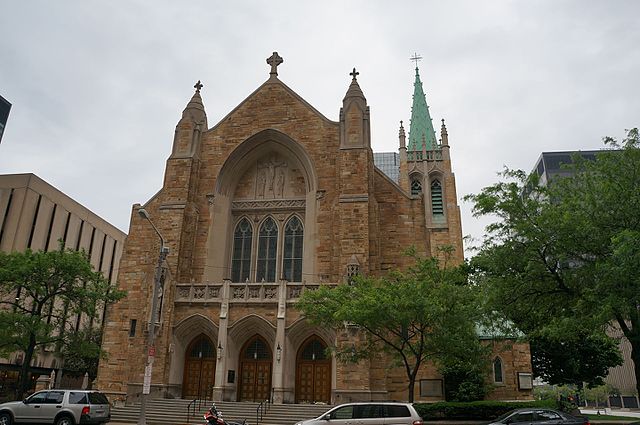Service learning is a requirement for multiple courses at John Carroll University, many of which expect students to interact with the community in a humanitarian manner. But, a recent controversial decision from the Catholic Diocese of Cleveland could complicate things for LGBTQ+ undergraduates enrolled in some of these classes.
Following the Sept. 1 release of the Diocese’s “Parish & School Policy on Issues of Sexuality and Gender Identity,” both the JCU and Cleveland community expressed concerns regarding queer expression and support in the Catholic faith across Northeast Ohio. As it stands, John Carroll is not directly affiliated with the Diocese so the university’s own queer inclusive non-discrimination policy will not be altered. Yet, these stances only apply inside John Carroll’s walls. When students go beyond Belvoir and Miramar to sites that must abide by the new policy, LGBTQ+ protection and inclusion becomes murky. This gray area is especially true for those in classes requiring service at locations that are subject to diocesan guidelines.
One of these courses is the JCU Philosophy Department’s Informal Logic and Critical Thinking (PL2000) which, for this semester, is hosted across the street from Carroll at Gesu Catholic School, one of the 84 institutions and parishes held to the Cleveland Diocese’s standard.
One facet of the course’s instruction is that students must teach on various topics to elementary school students via a “Philosophy for Kids” program. For those taking PL2000 or any other service learning course requiring students to volunteer at one of the institutions under the Catholic Diocese of Cleveland, Blue Streaks are expected to be in compliance with the Diocese’s policy when on the respective organization’s property.
A comment from the Diocese reads that “this policy applies to all offices, parishes, parish schools, and diocesan schools of the Catholic Diocese of Cleveland (each an “institution”) as well as their employees, personnel, volunteers, students, and youth participating in parish or institutional faith formation.”
The Carroll News reached out to the Catholic Diocese of Cleveland who declined an interview.
According to JCU student government president and past PL2000 student Jacob Kozlowski ‘24, “these new rules don’t have to be implemented at JCU for them to have terrible impacts on JCU students.”
“I had the opportunity to visit schools and students that will be impacted by the rules through John Carroll’s service learning program with CSSA,” Kozlowski told The Carroll News. “We’d visit a classroom once a week as part of an informal logic philosophy course and it’s just terrible to know [that] the students we met are expected to grow into their unique self when their institution leaders are dictating who they are and what they can say.”
The actions of the Catholic Diocese of Cleveland have also received criticism on a national scale. For Marianne Duddy-Burke, the Executive Director of the pro-LGBTQ+ Catholic organization DignityUSA, the policy creates more “institutional obstacles” for “catholic social justice teaching.”
“It is our responsibility to remove those [obstacles],” Duddy-Burke elaborated.
Despite the rapid onset of the Diocese’s decision and the resulting controversy, several JCU faculty were quick to react and develop plans to help the queer students in these courses feel safe and heard. Dr. Earl Spurgin, the Chair of both the Philosophy Department and John Carroll’s Faculty Council, says that programs like “Philosophy for Kids” now face two questions: what to do about students who are placed at these locations now and what to do about placements in the future.
“When it comes to students who are currently placed, I think we all agree that, for a student who is uncomfortable at one of those schools, we ideally would find an alternative assignment or work that they could do [to] be pulled out of that,” Spurgin told The Carroll News. “Now, the faculty member involved would have to weigh in on this. But speaking as chair of my department, I would encourage [faculty] to make some kind of accommodation for a student who’s uncomfortable.”
Regarding the future for service learning classes who visit institutions under the jurisdiction of the Catholic Diocese of Cleveland, Spurgin said that “there’s still discussion going on” and “there will be more discussions” to come. This includes receiving input from other members of the Faculty Council and from the John Carroll administration.
“We’re trying to work out how we would do that if a student had some concerns…in those environments,” John Carroll President Al Miciak told The Carroll News. “We want to recommit ourselves to our approach which is [that] everyone is welcome in ways that respect their identity.”
For LGBTQ+ students who do not feel respected in these spaces, Spurgin recommends that students express their views about “how [they] might feel threatened or unwelcome in light of the policy.”
“I think students should feel some comfort in the fact that many faculty are very concerned,” Spurgin continued. “Take some heart in the fact that you have allies in the faculty.”
For Duddy-Burke, responses like Spurgin’s illustrate that, despite the policy, there is still support for members of the LGBTQ+ community in the Catholic faith.
“The reality is that strong majorities of Catholics are very supportive of LGBTQ+ people and want our church to be an inclusive and affirming place,” she stated. “This outcry in Cleveland is a sign that Catholics are standing in solidarity. I think that’s a real sign of hope.”




TJ Lindstrom • Oct 13, 2023 at 1:54 pm
Well reported coverage of a really important issue. I hadn’t considered some of the ways the Diocese’s decision will have broader fallout in the many other institutions it touches. Excellent work!